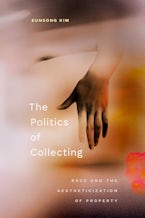“Eunsong Kim is one of the most original critics of art and poetics. In The Politics of Collecting, she deftly situates conceptual art and experimental poetry-their formal aesthetics, practices of collection, and market logics-within the history of capitalism and colonialism, demonstrating that colonial extraction and expropriation of land and labor are the condition of possibility for museums, archives, and poetry collection.”
- Lisa Lowe, author of (The Intimacies of Four Continents) “Eunsong Kim’s The Politics of Collecting is a remarkable achievement, deftly weaving museum culture, aesthetics, and Marxist analysis together to grapple with what lies beneath: the pernicious effects of racial capitalism that pervade histories of museum collections. In her case studies, Eunsong Kim examines establishments from the Getty to the Carnegie, the Archive for New Poetry and the Frick in order to consider the production of art collecting as an archive of settler colonialism, white supremacy, and antiblackness. In the depth, elegance, and fluidity of her readings, The Politics of Collecting coalesces into a multifaceted book that only Kim could write.”
- Kimberly Juanita Brown, author of (Mortevivum: Photography and the Politics of the Visual) "Eunsong Kim’s new book may very well upend many of the art historical orthodoxies of the last 40 years. . . . This is a very stimulating read, sure to ignite much debate and perhaps even shift the field in interesting new ways." - Hrag Vartanian (Hyperallergic) "The Politics of Collecting is a... challenging, but rewarding academic text that lays bare the often-hidden, tangled mechanisms of race, finances, aesthetics, and property at the foundation of art, archives, museums, and poetry." - Kara Carmack (H-Material-Culture) "Perhaps the most trenchant critique of the imbrication of art, property and racialization today can be found in scholar Eunsong Kim’s 2024 book The Politics of Collecting, in which she traces how the mid-19th-century consolidation of wealth in the hands of US robber barons and monopolies through violent union-busting also constructed the philosophies of accumulation, acquisition and taxonomization that characterize museums today."
- Simon Wu (Frieze) "Crossing boundaries in literary and critical digital studies, visual culture, museology, and modernity, Kim examines museums, avant-garde forms, digitization, and neoliberal aesthetics in terms of artistic institutional genealogy, particularly through the lenses of labor studies and art history, critical race studies, and material goods. . . . Stunningly researched, this volume is not to be missed. It will interest those studying the history of collecting, museum studies, art history, poetry, literary and critical studies, and labor studies. Highly recommended." - J. Decker (Choice)

